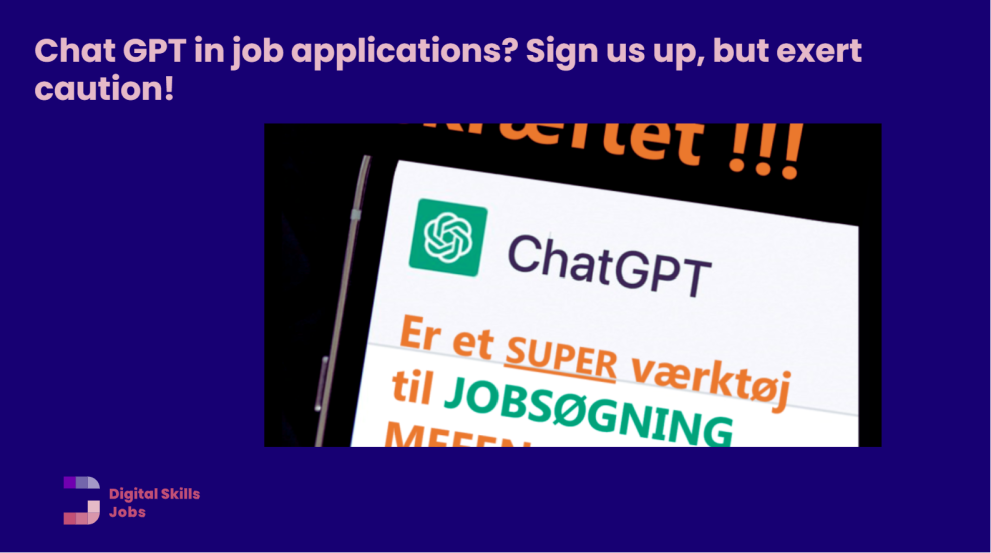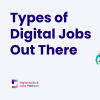Use of ChatGPT in Job Applications? Yes! But be careful...

Pernille From Hansen is a qualified manufacturing engineer from DTU and specialises in developing and improving job search methods through more than 14 years’ experience as a job consultant. She herself encountered ChatGPT back in January 2023 and started looking at how this LLM (large language model) could help her (and others) apply for a job.
This article is shared on the basis of Pernille’s self-written article on the experience with job applications via ChatGPT and the original can be found by visiting her LinkedIn page here. Our team at DSJC Denmark spoke to her to find out what she discovered. In Pernille's own words, “after generating many applications with ChatGPT, I think it is a super good tool to increase the quality of job applications, benefiting both jobseekers and employers.”
How can we use ChatGPT to help us on our job search
ChatGPT can help jobseekers structure and write their applications - an aspect even experienced candidates often struggle with. This reduces the most time-consuming (and frustrating) part of one's job search. With ChatGPT, one can quickly generate a draft for a good application, on which to build further, and tailor to their own interests. There is an added bonus here too: texts generated with the help of ChatGPT contain noticeably fewer errors (something that employers look out for when they can't exclude candidates based on their respective profiles.
AI or person? ChatGPT has shortcomings too
Several studies have been carried out on what employers see as the main errors/shortcomings in the applications they receive – and these include, but are not limited to:
- The layout of the application is too unstructured, obscure and contains too much text.
- The application does not describe how well the applicant's background and profile match the job characteristics.
- The motivation of the application for the job is unclear.
- The application lacks concrete examples of the competencies claimed by candidates.
- The application is too vague and does not go deep into the requirements of the profile.
- The candidate does not meet the main requirements of the vacancy notice and therefore is not a potential match.
ChatGPT can...
If you use it right though, you can generate a draft of complete application for just a minute. Pernille says that ChatGPT certainly has its advantages if she compares it to the average quality of applications she sees around. The text, generated by ChatGPT, appears well-structured, and there are several reasons for this. Pernille lists a few, including a clearer layout, objective, and motivation. The LLM (large-language-model) is good at drawing links between the requirements of the role and the information on the applicant's background one feeds into it. To sum up, Pernille believes that the AI tool can be of great benefit to those looking to facilitate their job search - and it can certainly provide a really good starting point to highlight one's motivation for the job.
And what about what it can't do?
As an expert in the field, Pernille is far from the thought that ChatGPT is the answer to all of our job search problems. There are still tons of things the LLM can not, in fact, do - and ultimately, is unable to fully replace an individual's touch. One example is its inability to adapt its writing style to such an extent that it is tailored to the applicant's strong and weak sides. Another drawback: it cannot provide concrete examples from one's experience that most employers want to see. The information for this has to come from the applicant themselves. In addition, the chatbot is still not able to judge whether one is qualified for the position - meaning that most of the underlying job search and matching of one's skills needs to be performed by the candidate - no machine.
Is ChatGPT cheating?
Our team at DSJC Denmark could not help but ask Pernille that question. If we sum up everything, are we cheating by using ChatGPT to optimise our recruitment chances? But Pernille doesn't seem to think so.
Instead, she sees ChatGPT as a "new, super useful tool that automates an hitherto manual and often cumbersome work processes", which can - in turn - result in employers receiving more targeted applications, and freeing up a large chunk of job seekers' time. Instead of spending their valuable time researching and looking for job vacancies, prospective applicants can instead focus on thinking outside of the box - like expanding to other industries/roles they could apply for.
Pernille regularly organises webinars for both job consultant teams and job seekers on using ChatGPT to support their job search. You can find her on LinkedIn here.





